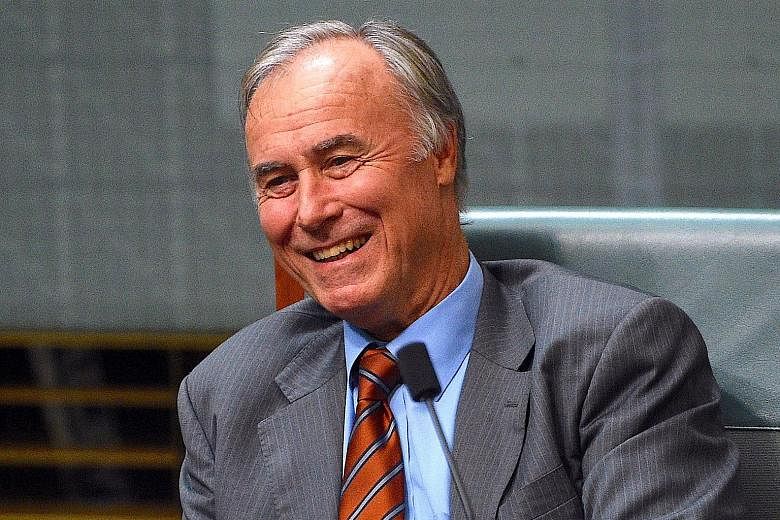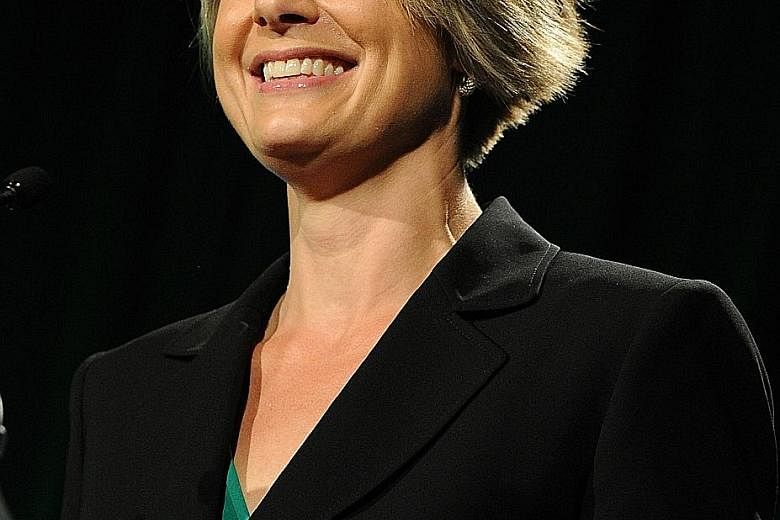During the past few weeks, residents of north-west Sydney have learnt to be slightly wary of answering their phones.
In many cases, it is a so-called "robocall" - an automated call from one of the candidates in a crucial special election taking place today.
The by-election in the federal seat of Bennelong is no ordinary ballot: it could cost the ruling Liberal-National coalition its parliamentary majority and determine the fate of Prime Minister Malcolm Turnbull. Neither the government nor the opposition Labor Party has left anything to chance.
The election is being held because Mr John Alexander of the Liberal Party was forced to resign as MP after realising he was a dual citizen via his British father. This emerged during an ongoing crisis that has forced nine MPs out of Parliament and cast a cloud over the legitimacy of several others.
Mr Alexander, a former tennis star, is contesting the seat after renouncing his British citizenship.
If he loses, the coalition will be left with just 75 of 150 MPs in the Lower House. The government would not immediately fall but Mr Turnbull would be under immense leadership pressure, especially as the coalition trails Labor in national opinion polls.
Not surprisingly, the nation's attention has been firmly on the election, particularly the role of the local Chinese-Australian community, which could swing the result.
Bennelong, 15km north-west of the city centre, has the highest proportion of Chinese-Australians of any electorate in the country. About 16 per cent of its residents were born in China and Hong Kong, and 21 per cent have Chinese ancestry, more than those with any other, including Australian (14 per cent) ancestry.
All candidates have been desperately trying to court the local Chinese-Australian vote in what has been a bitter, personal campaign.
Much of the attention has been on whether these voters will be affected by new federal laws to curb foreign interference in Australian politics, which appear to be aimed at Beijing.
Adding to the furore over Chinese meddling in Australian domestic affairs, Labor senator Sam Dastyari was forced to resign on Tuesday after it emerged he adopted pro-China stances on Hong Kong and the South China Sea after accepting political donations from a wealthy property developer with links to China's Communist Party.
Labor candidate Kristina Keneally, a former New South Wales premier, has accused Mr Turnbull of being anti-Chinese, and smearing the reputation of the Chinese community by raising the question of their loyalty to Australia.
"What we see from Malcolm Turnbull every single day is an assertion that our Chinese-Australians... are (people) to be suspicious of," Ms Keneally said.
"It's not just Chinese-Australians, but Korean-Australians too, who know they're getting tarred by (Mr) Turnbull's assertion that Asian-Australians are not fully-fledged members of team Australia."
Ms Keneally likened the PM to right-wing firebrand Pauline Hanson, a notorious opponent of Asian migration.
Mr Turnbull hit back, saying Labor's claim that he was "China-phobic" was "desperate and absurd". He has repeatedly pointed out that his grand-daughter has Chinese ancestry via his daughter-in-law, who was born in Hong Kong.
He told 3AW Radio: "What Keneally (has) been doing in Bennelong is demeaning and desperate."
Opinion polls indicate the election will be a tight contest, though Mr Alexander is favoured to win.
A ReachTel poll out on Thursday found Mr Alexander leading by 53 per cent to 47 per cent. But a Newspoll earlier in the week found the candidates even on 50-50.
According to the ReachTel poll, 23 per cent of voters believed China had been unfairly targeted in the debate about foreign interference in Australian politics and 51 per cent did not, with the rest undecided.
Mr Justin Li, president of the Australian Asian Association of Bennelong, believes Asian voters could prove decisive but adds that most would be focused on "bread and butter" issues. "The vast majority of Chinese-Australians, especially those who've lived in Australia for a long time, don't care so much about the motherland politics," Mr Li told SBS News.
"They're far more interested in issues like paying off mortgages, paying off bills, sending kids to school."
The seat was held between 1974 and 2007 by former Liberal PM John Howard and has only ever been held by Labor once, between 2007 and 2010.
Ms Keneally is the outsider but, even if she loses, Mr Turnbull could still face pressure if it is a tight race.
In the meantime, neither side is leaving anything to chance. And this includes a seemingly endless series of robocalls to voters.
A journalist and local resident, Ms Kathryn Wicks, recounted the numerous robocalls "mostly at dinner", and visits by the candidates and calls from polling agencies.
"Congratulations, Mr Alexander and Mrs Keneally," she wrote. "Bennelong is super-annoyed at both of you. Equally."


